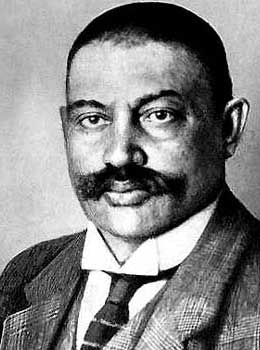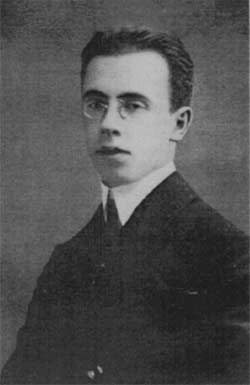<Back to Index>
- Agent of the Okhrana Yevno Fishelevich Azef, 1869
- Agent of the Okhrana Dmitry Grigoriyevich Bogrov, 1887
PAGE SPONSOR

Yevno Azef (Russian: Евгений Филиппович (Евно Фишелевич) Азеф, 1869 – 1918, also transliterated as Evno Azef), was a Russian socialist revolutionary who was also a double agent working both as an organizer of assassinations for the Socialist - Revolutionary Party (also known as SRs or Esers) and a police spy for the Okhrana, the Imperial secret police. He was an agent provocateur, carrying out acts of terrorism, which justified the police's arresting his accomplices.
Born as Evno Fishelevich Azef in Lyskava (now Brest Voblast, Belarus) in 1869 to a poor Jewish family. He was the second of seven children.
He received only basic schooling. Later he worked as a journalist and a traveling salesman. He became a revolutionary as a young man. In 1892, when he was about to be arrested, he embezzled 800 rubles and fled to Germany, first to Karlsruhe and then Darmstadt. There he studied to become an electrical engineer. In those years Sergei Vasilyevich Zubatov of the Okhrana also recruited him as a police informer.
In Germany he also joined a group of exiled members of the Russian Social Democratic Party and traveled all over Europe to meet other revolutionaries. Azev joined an SR group in 1894. He traveled widely through Europe, making contact with prominent SRs, gathering information and working his way into the inner circle of the Socialist - Revolutionary movements. Among those who unwittingly paved Azev's way were the respected narodnik Kh. O. Zhitlovsky and A. A. Argunov, founder of the 'Northern Union of Socialist - Revolutionaries' in 1896. This was one of the major constituents of the unified PSR, and Azev was its plenipotentiary abroad. He rose in status to become a member of the party's central committee.
In 1899, at the behest of the tsarist Okhrana, Azev returned to Moscow, working as an electrical engineer and making himself indispensable to the PSR. In 1903 he supplied the Okhrana with information which led to the arrest of Grigory Gershuni, head of the party's Combat Organization (its military branch), enabling Azef to succeed him (with Boris Savinkov as his deputy). In that position he organized assassinations including those of Vyacheslav Plehve in 1904 and the Tsar's uncle Grand Duke Sergius Alexandrovich in 1905. By 1908, Azef was playing the double role of a revolutionary assassin and police spy who received 1000 rubles a month from the authorities. Sympathizers in the ranks of the police leaked information to the party, but it was not believed, being taken as malicious propaganda.
Eventually, a defector from the police convinced revolutionary Vladimir Burtsev to begin a long investigation. Burtsev finally spoke to Alexei Lopukhin, a former director of the police department, who verified that Azef had been working for them.
Burtsev exposed Azef in February 1909. A Court of Honor was held in Paris to verify Azef's guilt. The SRs decided to let Azef go home after he promised to provide convincing proof of his innocence the following day. Instead, Azef escaped retaliation and fled again to Germany. His wife, Ljuba Mankin, who had been unaware of his double dealing, divorced him and moved to the United States.
In Germany, Azef lived with a singer and worked as a corset salesman and stock speculator. During the First World War, he was interned as an enemy alien. In prison he suffered from a kidney disease but was released in December 1917.
Yevno Azef died of renal failure in Berlin on April 24, 1918. He was buried in an unmarked grave in Wilmersdorf cemetery.

Dmitry Grigoriyevich Bogrov (1887 – 24 September 1911) (Russian: Дмитрий Григорьевич Богров) was the assassin of the Russian Prime Minister Pyotr Stolypin.
Born Mordekhai Gershkovich Bogrov (Мордехай Гершкович Богров) into a family of Jewish merchants in Kiev (Russian Empire), Bogrov, while simultaneously acting as an anarchist revolutionary, had been an agent of the Okhrana secret police since 1906, informing on the activities of Socialist Revolutionaries, Social Democrats and anarchists.
On 14 September 1911, Dmitry Bogrov shot the Russian prime minister Pyotr Stolypin, in the Kiev Opera House, in front of Tsar Nicholas II and two of his daughters. Stolypin died four days later. This act was committed ostensibly in order to decapitate a successful and popular conservative reform movement and, thus, hasten violent revolution. Bogrov was also attempting to stop the anti - Jewish pogroms that Stolypin was inciting. However, it has been alleged that Bogrov was permitted to act at the behest of extreme right wing elements in the Tsarist secret police who detested Stolypin because of his agrarian reforms and his flair for parliamentary government. (Aleksandr Solzhenitsyn extensively investigates and gives full credit to this conjecture in his historical novel August 1914.)
Bogrov was tried by the district military court. Despite the plea of Stolypin's widow to the court to save Bogrov's life (she said that taking the young man's life would not bring her husband back), Bogrov was sentenced to death and executed by hanging on September 24 [O.S. September 11] 1911 in the Kiev fortress of Lysa Hora.
Significantly, the investigation of Stolypin's assassination was later discontinued at the express order of Nicholas II.